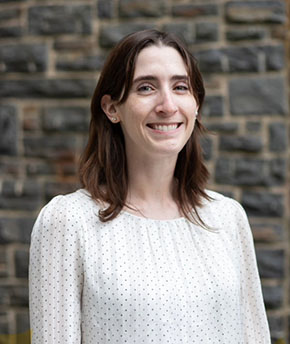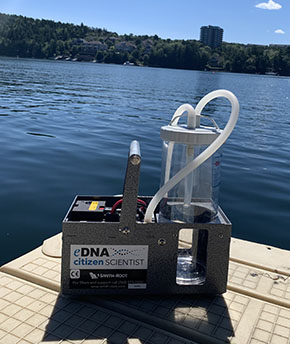This summer, a network of citizen scientists and ĆĄÅ®×ö°® researchers will fan out across Nova Scotia to collect samples of seawater that will provide microscopic data on the species living off our shores and how those populations might change over time as ocean temperatures warm and marine life shift habitats.
 They will do that thanks to (COCO), an innovative group started by students and faculty in ĆĄÅ®×ö°®'s Department of Biology to track long-term changes in the province's coastal ecosystems that will rely heavily on Nova Scotia residents interested in helping monitor changes in marine life off eastern Canada.
They will do that thanks to (COCO), an innovative group started by students and faculty in ĆĄÅ®×ö°®'s Department of Biology to track long-term changes in the province's coastal ecosystems that will rely heavily on Nova Scotia residents interested in helping monitor changes in marine life off eastern Canada.
Volunteers in six communities throughout the province will gather the seawater samples, run them through a porous filter and send that free-of-charge to the team, led by PhD candidate Samantha Beal (shown right). The researchers will use environmental (e)DNA analysis to identify the animals found in those coastal ecosystems, with a single sample capable of containing multiple species.
"The ocean is changing and the Northwest Atlantic is heating up quicker than the global average, so we want to have monitoring that is ongoing so we can identify changes in the species that we're seeing up and down the province," says Beal at the Future of Marine Ecosystems (FOME) lab at Dal.
"I'm excited to work with the communities and also not just have them collect the samples, but to hear what they're seeing as well and work together to gather more information about the environment that we all share."
A new way to study marine life
The process offers a simple, non-invasive way to study marine biodiversity, which would traditionally involve boats, nets and hours of fieldwork at great expense. Instead of catching animals, the team collects the tiny traces of DNA they leave behind in the water.
Also, by involving communities in the work, COCO strengthens local stewardship, builds scientific literacy and connects people with the ocean in a meaningful way.
 Participants ā dubbed COCOs ā will get hands-on training in eDNA sampling and an introduction to the project's goals. The sampling machines will be either provided directly or available for pickup from a central location and prior to each sampling event, partners will receive kits with everything they need. Once samples are collected, filters are mailed back using a prepaid shipping box. Beal explains that once she receives the sample, she will extract the DNA off the filter.
Participants ā dubbed COCOs ā will get hands-on training in eDNA sampling and an introduction to the project's goals. The sampling machines will be either provided directly or available for pickup from a central location and prior to each sampling event, partners will receive kits with everything they need. Once samples are collected, filters are mailed back using a prepaid shipping box. Beal explains that once she receives the sample, she will extract the DNA off the filter.
It is a relatively straightforward process that could have a significant impact on the understanding of what is in the water now and how that may change in the future. COCOs will be asked to collect samples three times a year, ideally in March, July and November.
"The idea is to build out this network so that then over time we can start to build a picture of what's living in different parts of the ocean in this province, but particularly how it's changing with climate change as new species are coming in," Dr. Derek Tittensor, who is supervising Beal's work along with Dr. Paul Bentzen, says in the lab.
"It can act as a sort of an early warning or early detection network, and Sam will get back to the volunteers with a list of all the species that we find in the water there, which is pretty amazing!"
Listening to local voices
By repeating this seasonally, year after year, they can build a strong baseline to determine how things are moving around our coasts as the waters warm and species move north.
Beal, a first-year PhD student, has done some sample testing already and detected a slew of species, including alewife, American eel, herring, mackerel, tom cod, silverside, flounder, sculpin and redfish.
She eventually hopes to sample for invertebrate species, sharks and mammals.
With more eyes ā and eDNA samplers ā on theāÆwater, we can track these shifts together and make sure local voicesāÆare part of the conversation
"With more eyes ā and eDNA samplers ā on theāÆwater, we can track these shifts together and make sure local voicesāÆare part of the conversation," she says.
Beal will launch an 'eDNA roadshow' next month to explain the project and recruit participants in the communities where the collections will take place. Anyone interested in participating can go to the COCO Instagram page (@coco.e.dna) for more information. Hour-long sessions are planned for the following dates so far:
Yarmouth: 3pm on Aug. 18thāÆat the Izaak Walton Killam Memorial Library
Liverpool: 2pm on Aug. 20thāÆat the Thomas H. Raddall LibraryĢż
Sheet Harbour: 1pm on Aug. 26thāÆat the Sheet Harbour Public Library
°ä²¹²Ō²õ“Ē:Ģż 3 p.m. on Aug. 27th at the Canso Public LibraryĢż
Louisbourg: 3pm on Aug. 29thāÆat the WW Lewis Memorial Library

